#book haul 2018
Explore tagged Tumblr posts
Text
Kuro shit <3
A parcel of Japanese items recently arrived and these are specifically the Black Butler items from my haul.

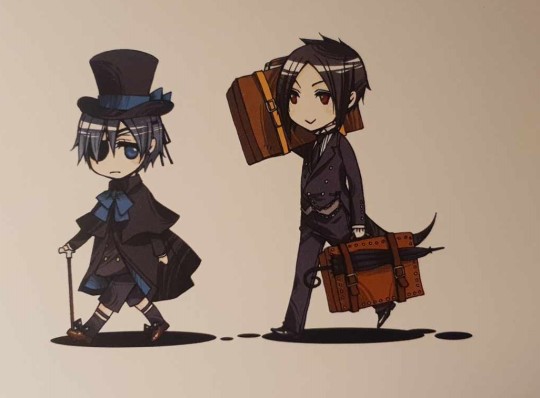
The first item is a double sided mini poster. Absolutely loved the art by Yana; I almost managed to snag the separate images as collectable cards but it wasn't meant to be, so I settled for this version instead. I don't mind to much though as on the flip side is this adorable doodle of them travelling.

Had to pick these cuties up! I only have a couple of items for Soma and Agni in my collection, since they hardly have any merch. These are from a line of keychains marketed for "Book of Circus", they originally came on a cardboard backing that could be folded out to display them but unfortunately it had aged poorly so they will be hung elsewhere.
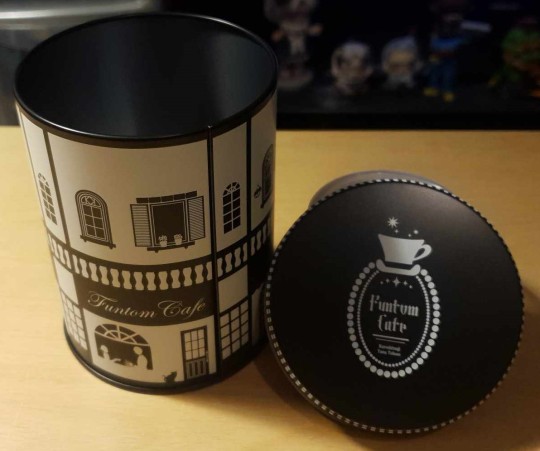
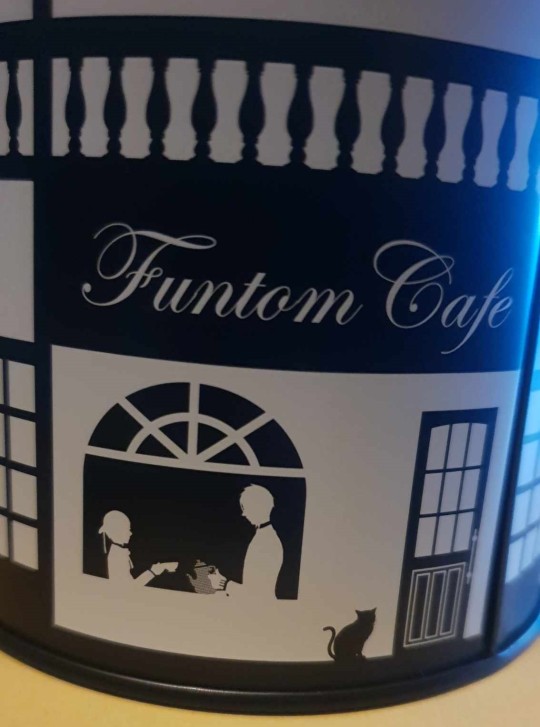
I came across this sealed Funtom Cafe Tea tin by accident when perusing for something else entirely. I had seen similar shadow outline designs used on previous merchandise but not this particular piece.
I am so glad that the tea inside expired in 2018, because this meant that it was no longer a consumable food product and could be sent from Japan to the UK.
Also, had to just mention how the seller had packaged this up. The tin was bubble wrapped up and sealed with London themed washi tape and inside was a little hand written note... Very cute.

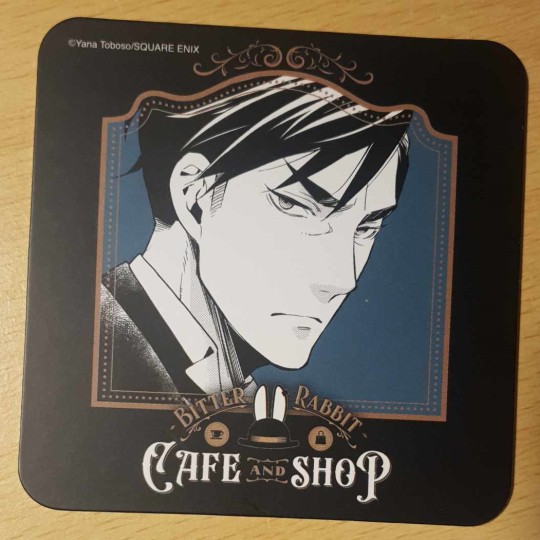
I don't know why but I had completely forgotten to buy this coaster when I ordered the other one of him!? It is Diedrich... Enough said....

I also purchased this amazing "Wall Bang/Kabe-don" G-FANTASY Poster of Sebastian Michaelis.
How could I not?
The edges of the poster are uneven from where his original owner removed him from the magazine, but once I have fixed that he will be ready to get situated into a frame.
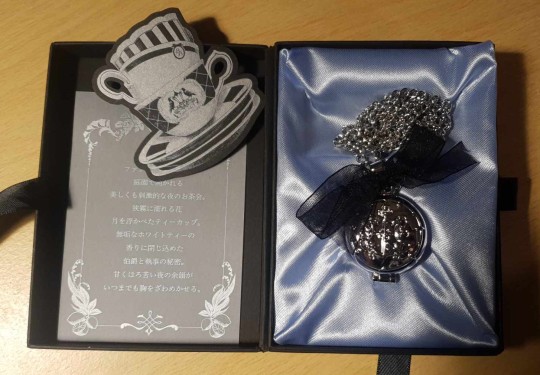
Finally, I have the Kuroshitsuji Black Label Night Garden Perfume!
I had been searching for this item for a long time. Previously, I was either unwilling to pay the hefty price tag or I was told due to its nature that it could not be shipped overseas to me.
I will post about it in more detail separately but it is stunning and arrived in New condition, and with zero international shipping problems.
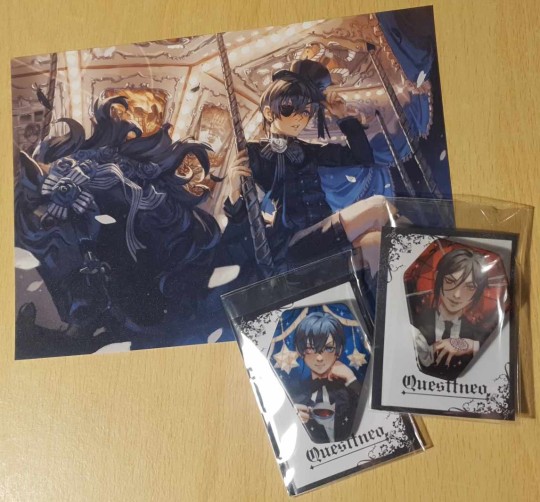
Not part of the Japanese Proxy shipment but just wanted to draw attention to @questtneo's Etsy.
Absolutely amazing seller and gorgeous artwork. Please show them some support <3
I ordered the "CaroCiel Print"
(I don't know if it was intentional but it reminds me alot of the "Artfx J statue", with Phantomhive atop his Chess Knight horse.)
And I bought both the Ciel and Sebastian from their coffin shaped pin selection as well.
#kuroshitsuji#black butler#black butler merch#sebastian michaelis#o!ciel#ciel phantomhive#soma asman kadar#agni black butler#diedrich#funtom cafe
46 notes
·
View notes
Text
self-indulgent TMA statement fic<3
CASE: #0180803
Back again, aren’t I? I thought that, with everything that’s been going on around here, I should probably make a statement about the Leitner which got me hired at the institute in the first place.
Statement of Marek, A. Szafran, Head Librarian at the Magnus Institute, London, regarding a book belonging to the library of one Jurgen Leitner. Statement recorded by subject, March 8th, 2018.
Statement begins.
I know what you’re probably thinking (though, not in the “all knowing eye" sort of way) “it’s just another cursed book, we have enough of those cases already,” why pile on even more work onto the backs of the research team? To be fair, my own team of assistants at the library usually deal with the categorisation and recognition of Leitners, so the archivists need not worry…too much.
Apologies for the slight tangent, I have been prone to those throughout my life, but they’ve been incessantly more common these days. Anyhow, as you should well know, I was removed from my childhood home at age 17. That led me to seeking solace at my Godfather’s home, here, in London. He cared for me, but remained of the belief that I should earn my keep in some way, despite the fact that I shortly moved into my uni campus anyway.
Finding work is immensely difficult, by the way, far tougher than the stories our grandparents tell of simply walking into a building and receiving honest work from pure will and force. Youth cannot be hired without any sort of previous working experience, but we cannot gain working experience if we’re not hired in the first place…I’ll share my grievances with systemic capitalism another day. What I meant to say is, I couldn’t get any job, apart from a less-than-minimum-wage-paying bookshop position; which meant that whenever I wasn’t studying seminars or writing literature essays, I found myself stocking books, hauling them from delivery vans, and reading.
If you’ve ever worked at a bookshop, you’ll know how deliveries work, and how the amount of copies of any given text is tracked. At some point, I was in charge of the process when I noticed the presence of a particular book that I had not seen stocked in our shop before. I did, however, recognise the cover as that of a book that I had planned on reading the year prior, back when I had more free time. It depicted a doorknob, seemingly covered in circular ridges, as well as the title: “House of Leaves,” by Mark Z. Danielewski. “Polish, then, like me,” was my first thought, after which my eyes shifted to the book's contents. Some pages were visibly written backwards, others had the words printed in spirals, or completely removed from the set structure.
This wasn’t unusual, as I remembered from my previous research, this particular book was meant to be ergodic literature. The story itself sounded like something the Head Archivist would enjoy exploring, actually; an academic satire written in a way that is purposely difficult for the reader to decipher. There was only one copy in that delivery, as well as in the bookshop as a whole, which was odd. I didn’t think much of it, though, because that same night I used my employee discount to take the thing home with me, and thereby started reading immediately.
Another thing that struck me as unusual, which I now view in perfect clarity, was the fact that this copy of House Of Leaves seemed to have been used before, it even contained an embossed stamp on the front page: the all-too-familiar “from the library of Jurgen Leitner.” Had no idea what that meant at the time, of course, so I- well, I kept on reading.
People have said that the book had made them insane before, reviews commented on the immense difficulty of the text as well as the sinister feeling it gave them after months of reading; but my connection to this edition went far deeper than that. I started hearing voices, those of film directors, lecturers, and the deep-voiced “good job” of a supposedly comforting tattoo artist. You could argue that I have some mental disorder or another, but both then and now doctors confirmed my health to be in perfectly valid condition. Mostly.
Eventually, I also began hearing unusual sounds. I had always had issues hearing people’s breathing rather loudly when I was overwhelmed, but now the breathing was heavier, wetter; I felt as though I could hear a person’s organs shifting, lungs inflating, deflating, inflating again, across the room from me. Then I heard the Minotaur.
He was a thing of great strength, the sound of hooves solid on the ground, and the harsh whip of its tail slashed through the air multiple times, as though battering off a swarm of rigid flies. I never saw the Minotaur, but hearing enough proved that it was a mass to be reckoned with, a jagged, meaty build made to chase me. The premonition seemed to be that he wouldn't stop searching until I was no longer within his labyrinth; only issue being that my body was not physically present in said labyrinth. Hence, it began combing through the folds of my brain, each ridge explored like the walls of a corridor, my thoughts could never escape the Minotaur. Evidently, its purpose can only be fulfilled once I'm no longer in this…symbolic? labyrinth. I must either be driven insane, quite literally "out" of my mind, or dead.
It’s been chasing me ever since, in the back of my mind, behind my back, I can almost see it in the mirror when I brush my teeth or curl my hair. I tried to throw the book out, destroy it, burn it, desolate the thing. No use. So I came here; the book is in the archives now.
I feel as though it’s still driving me mad. Because in its place, by the desk where my second bookshelf used to be, I found a new yellow door. I dare not open it, lest the Minotaur decides to end the hunt, my lungs pierced by his twisted horns.
Statement ends.
yeahhhhhh, little statement I wrote up about two years ago, thought tumblr might enjoy it! there's a few more pieces on my ao3 account, dziewczynka_z_chryzantemami :)
#the magnus archives#tma#house of leaves#I actually tried reading house of leaves and only got half way through#that book is a nightmare#but i love it#tma fanfic#hol fanfic
6 notes
·
View notes
Note
If the netherlands has friesians, America has mustangs, and Saudi Arabia has arabians, what breeds come from sweden?
There are a few to pick from so I'll just list them here and I've included some of my own photos of each breed so you can get a better idea of their characteristics. There are no "historical" pictures included, so this is a bit of a departure from what I normally do so I hope people don't mind.
Svensk Varmblod (SWB)
Sweden has the Swedish warmblood which has been very successful in showjumping, dressage, eventing, and even driving. As of 2018 it is the most common horse breed in Sweden followed by Icelandic horses and then warmblooded trotters (two non-native breeds). In 2018, of the top two highest ranking show jumping horse and rider duos, both horses were Swedish Warmbloods (Hanson WL and Albfuehren’s Bianca). The examples below are of two Swedish Warmbloods in more commonplace use as all round riding horses.

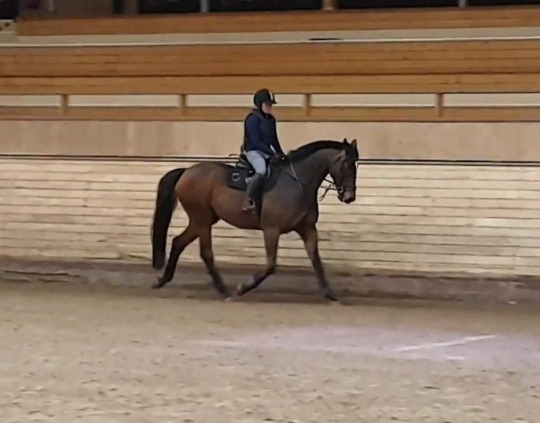
Nordsvensk Brukshäst and Kallblodstravare
The North Swedish Horse (Nordsvensk) is a native breed of heavy horse. It is still popular for riding, driving and farm work. Lighter lines within the breed are bred for harness racing and are registered in the stud-book of Svensk Kallblodstravare, that is to say Swedish Coldblood Trotter. This split happened in 1964, creating a heavier working-type and a lighter trotting horse. The Swedish, Norwegian and Finnish cold blood trotters are the only ones that exist in the world. One of the most famous Swedish Coldblood Trotters is probably Järvsöfaks. He holds the current world record for Coldbloods in wins, consecutive wins (42), and the coldblood trotter world record time, 1:17.9 per kilometer. The photos bellow are of the heavier type (Nordsvensk Brukshäst).


Svensk Ardenner
The Swedish Ardennes is it's own breed and the result of crossing the imported Ardennes horses to the Nordsvensk. The breed was developed in the late 19th century in response to demands within agriculture. They are a medium-sized draught horse breed that are still used in areas inaccessible to machinery to haul timber.
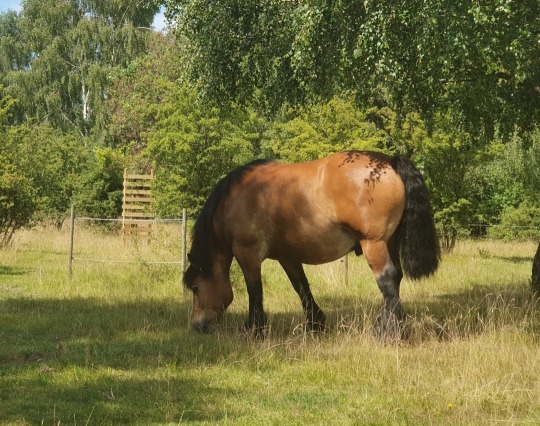
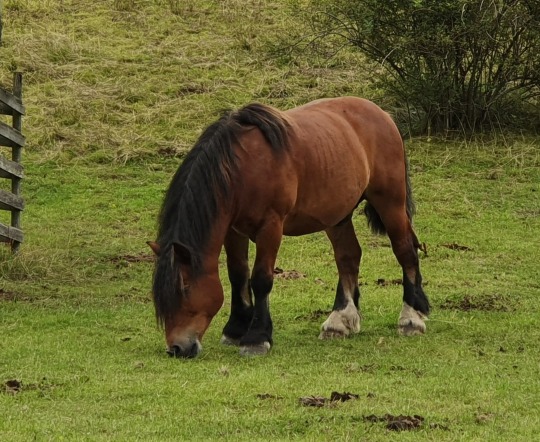
Gotlands Russ
The Gotlands Russ is an old breed of Swedish pony. Feral horses on Gotland have been documented since the 13th century, but in the mid 19th century settlers caused their numbers to decline and despite a breeding centre being founded in 1880 there was only 14 left in 1922. In the process of rehabilitating the breed two Welsh stallions were used. The stud-book has been closed to outside blood since 1971. They are good all round ponies that are often used for harness racing.

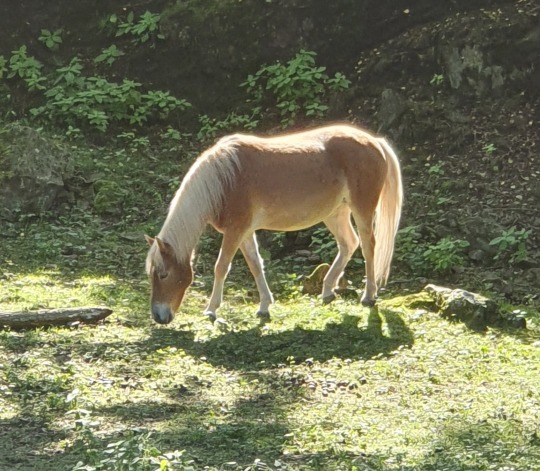
#horses#horse#Sweden#Swedish horse breeds#horse breeds#Swedish warmblood#north swedish horse#Swedish ardennes#gotlands Russ#horses in art history
71 notes
·
View notes
Text
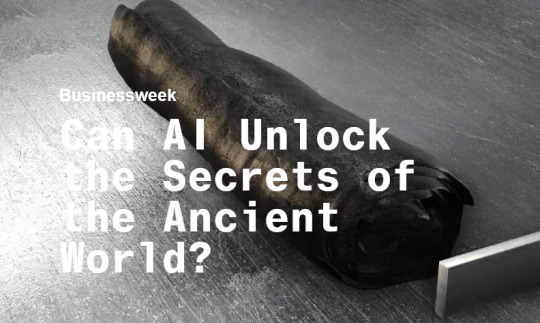
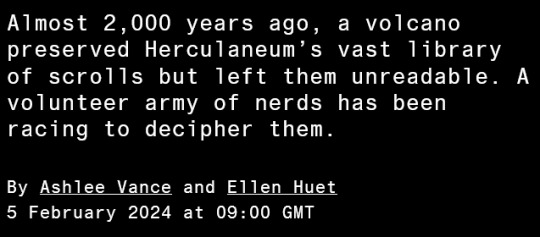
A few years ago, during one of California’s steadily worsening wildfire seasons, Nat Friedman’s family home burned down. A few months after that, Friedman was in Covid-19 lockdown in the Bay Area, both freaked out and bored. Like many a middle-aged dad, he turned for healing and guidance to ancient Rome. While some of us were watching Tiger King and playing with our kids’ Legos, he read books about the empire and helped his daughter make paper models of Roman villas. Instead of sourdough, he learned to bake Panis Quadratus, a Roman loaf pictured in some of the frescoes found in Pompeii. During sleepless pandemic nights, he spent hours trawling the internet for more Rome stuff. That’s how he arrived at the Herculaneum papyri, a fork in the road that led him toward further obsession. He recalls exclaiming: “How the hell has no one ever told me about this?”
The Herculaneum papyri are a collection of scrolls whose status among classicists approaches the mythical. The scrolls were buried inside an Italian countryside villa by the same volcanic eruption in 79 A.D. that froze Pompeii in time. To date, only about 800 have been recovered from the small portion of the villa that’s been excavated. But it’s thought that the villa, which historians believe belonged to Julius Caesar’s prosperous father-in-law, had a huge library that could contain thousands or even tens of thousands more. Such a haul would represent the largest collection of ancient texts ever discovered, and the conventional wisdom among scholars is that it would multiply our supply of ancient Greek and Roman poetry, plays and philosophy by manyfold. High on their wish lists are works by the likes of Aeschylus, Sappho and Sophocles, but some say it’s easy to imagine fresh revelations about the earliest years of Christianity.
“Some of these texts could completely rewrite the history of key periods of the ancient world,” says Robert Fowler, a classicist and the chair of the Herculaneum Society, a charity that tries to raise awareness of the scrolls and the villa site. “This is the society from which the modern Western world is descended.”
The reason we don’t know exactly what’s in the Herculaneum papyri is, y’know, volcano. The scrolls were preserved by the voluminous amount of superhot mud and debris that surrounded them, but the knock-on effects of Mount Vesuvius charred them beyond recognition. The ones that have been excavated look like leftover logs in a doused campfire. People have spent hundreds of years trying to unroll them—sometimes carefully, sometimes not. And the scrolls are brittle. Even the most meticulous attempts at unrolling have tended to end badly, with them crumbling into ashy pieces.
In recent years, efforts have been made to create high-resolution, 3D scans of the scrolls’ interiors, the idea being to unspool them virtually. This work, though, has often been more tantalizing than revelatory. Scholars have been able to glimpse only snippets of the scrolls’ innards and hints of ink on the papyrus. Some experts have sworn they could see letters in the scans, but consensus proved elusive, and scanning the entire cache is logistically difficult and prohibitively expensive for all but the deepest-pocketed patrons. Anything on the order of words or paragraphs has long remained a mystery.
But Friedman wasn’t your average Rome-loving dad. He was the chief executive officer of GitHub Inc., the massive software development platform that Microsoft Corp. acquired in 2018. Within GitHub, Friedman had been developing one of the first coding assistants powered by artificial intelligence, and he’d seen the rising power of AI firsthand. He had a hunch that AI algorithms might be able to find patterns in the scroll images that humans had missed.
After studying the problem for some time and ingratiating himself with the classics community, Friedman, who’s left GitHub to become an AI-focused investor, decided to start a contest. Last year he launched the Vesuvius Challenge, offering $1 million in prizes to people who could develop AI software capable of reading four passages from a single scroll. “Maybe there was obvious stuff no one had tried,” he recalls thinking. “My life has validated this notion again and again.”
As the months ticked by, it became clear that Friedman’s hunch was a good one. Contestants from around the world, many of them twentysomethings with computer science backgrounds, developed new techniques for taking the 3D scans and flattening them into more readable sheets. Some appeared to find letters, then words. They swapped messages about their work and progress on a Discord chat, as the often much older classicists sometimes looked on in hopeful awe and sometimes slagged off the amateur historians.
On Feb. 5, Friedman and his academic partner Brent Seales, a computer science professor and scroll expert, plan to reveal that a group of contestants has delivered transcriptions of many more than four passages from one of the scrolls. While it’s early to draw any sweeping conclusions from this bit of work, Friedman says he’s confident that the same techniques will deliver far more of the scrolls’ contents. “My goal,” he says, “is to unlock all of them.”
Before Mount Vesuvius erupted, the town of Herculaneum sat at the edge of the Gulf of Naples, the sort of getaway wealthy Romans used to relax and think. Unlike Pompeii, which took a direct hit from the Vesuvian lava flow, Herculaneum was buried gradually by waves of ash, pumice and gases. Although the process was anything but gentle, most inhabitants had time to escape, and much of the town was left intact under the hardening igneous rock. Farmers first rediscovered the town in the 18th century, when some well-diggers found marble statues in the ground. In 1750 one of them collided with the marble floor of the villa thought to belong to Caesar’s father-in-law, Senator Lucius Calpurnius Piso Caesoninus, known to historians today as Piso.
During this time, the first excavators who dug tunnels into the villa to map it were mostly after more obviously valuable artifacts, like the statues, paintings and recognizable household objects. Initially, people who ran across the scrolls, some of which were scattered across the colorful floor mosaics, thought they were just logs and threw them on a fire. Eventually, though, somebody noticed the logs were often found in what appeared to be libraries or reading rooms, and realized they were burnt papyrus. Anyone who tried to open one, however, found it crumbling in their hands.
Terrible things happened to the scrolls in the many decades that followed. The scientif-ish attempts to loosen the pages included pouring mercury on them (don’t do that) and wafting a combination of gases over them (ditto). Some of the scrolls have been sliced in half, scooped out and generally abused in ways that still make historians weep. The person who came the closest in this period was Antonio Piaggio, a priest. In the late 1700s he built a wooden rack that pulled silken threads attached to the edge of the scrolls and could be adjusted with a simple mechanism to unfurl the document ever so gently, at a rate of 1 inch per day. Improbably, it sort of worked; the contraption opened some scrolls, though it tended to damage them or outright tear them into pieces. In later centuries, teams organized by other European powers, including one assembled by Napoleon, pieced together torn bits of mostly illegible text here and there.
Today the villa remains mostly buried, unexcavated and off-limits even to the experts. Most of what’s been found there and proven legible has been attributed to Philodemus, an Epicurean philosopher and poet, leading historians to hope there’s a much bigger main library buried elsewhere on-site. A wealthy, educated man like Piso would have had the classics of the day along with more modern works of history, law and philosophy, the thinking goes. “I do believe there’s a much bigger library there,” says Richard Janko, a University of Michigan classical studies professor who’s spent painstaking hours assembling scroll fragments by hand, like a jigsaw puzzle. “I see no reason to think it should not still be there and preserved in the same way.” Even an ordinary citizen from that time could have collections of tens of thousands of scrolls, Janko says. Piso is known to have corresponded often with the Roman statesman Cicero, and the apostle Paul had passed through the region a couple of decades before Vesuvius erupted. There could be writings tied to his visit that comment on Jesus and Christianity. “We have about 800 scrolls from the villa today,” Janko says. “There could be thousands or tens of thousands more.”
In the modern era, the great pioneer of the scrolls is Brent Seales, a computer science professor at the University of Kentucky. For the past 20 years he’s used advanced medical imaging technology designed for CT scans and ultrasounds to analyze unreadable old texts. For most of that time he’s made the Herculaneum papyri his primary quest. “I had to,” he says. “No one else was working on it, and no one really thought it was even possible.”
Progress was slow. Seales built software that could theoretically take the scans of a coiled scroll and unroll it virtually, but it wasn’t prepared to handle a real Herculaneum scroll when he put it to the test in 2009. “The complexity of what we saw broke all of my software,” he says. “The layers inside the scroll were not uniform. They were all tangled and mashed together, and my software could not follow them reliably.”
By 2016 he and his students had managed to read the Ein Gedi scroll, a charred ancient Hebrew text, by programming their specialized software to detect changes in density between the burnt manuscript and the burnt ink layered onto it. The software made the letters light up against a darker background. Seales’ team had high hopes to apply this technique to the Herculaneum papyri, but those were written with a different, carbon-based ink that their imaging gear couldn’t illuminate in the same way.
Over the past few years, Seales has begun experimenting with AI. He and his team have scanned the scrolls with more powerful imaging machines, examined portions of the papyrus where ink was visible and trained algorithms on what those patterns looked like. The hope was that the AI would start picking up on details that the human eye missed and could apply what it learned to more obfuscated scroll chunks. This approach proved fruitful, though it remained a battle of inches. Seales’ technology uncovered bits and pieces of the scrolls, but they were mostly unreadable. He needed another breakthrough.
Friedman set up Google alerts for Seales and the papyri in 2020, while still early in his Rome obsession. After a year passed with no news, he started watching YouTube videos of Seales discussing the underlying challenges. Among other things, he needed money. By 2022, Friedman was convinced he could help. He invited Seales out to California for an event where Silicon Valley types get together and share big ideas. Seales gave a short presentation on the scrolls to the group, but no one bit. “I felt very, very guilty about this and embarrassed because he’d come out to California, and California had failed him,” Friedman says.
On a whim, Friedman proposed the idea of a contest to Seales. He said he’d put up some of his own money to fund it, and his investing partner Daniel Gross offered to match it.
Seales says he was mindful of the trade-offs. The Herculaneum papyri had turned into his life’s work, and he wanted to be the one to decode them. More than a few of his students had also poured time and energy into the project and planned to publish papers about their efforts. Now, suddenly, a couple of rich guys from Silicon Valley were barging into their territory and suggesting that internet randos could deliver the breakthroughs that had eluded the experts.
More than glory, though, Seales really just hoped the scrolls would be read, and he agreed to hear Friedman out and help design the AI contest. They kicked off the Vesuvius Challenge last year on the Ides of March. Friedman announced the contest on the platform we fondly remember as Twitter, and many of his tech friends agreed to pledge their money toward the effort while a cohort of budding papyrologists began to dig into the task at hand. After a couple of days, Friedman had amassed enough money to offer $1 million in prizes, along with some extra money to throw at some of the more time-intensive basics.
Friedman hired people online to gather the existing scroll imagery, catalog it and create software tools that made it easier to chop the scrolls into segments and to flatten the images out into something that was readable on a computer screen. After finding a handful of people who were particularly good at this, he made them full members of his scroll contest team, paying them $40 an hour. His hobby was turning into a lifestyle.
The initial splash of attention helped open new doors. Seales had lobbied Italian and British collectors for years to scan his first scrolls. Suddenly the Italians were now offering up two new scrolls for scanning to provide more AI training data. With Friedman’s backing, a team set to work building precision-fitting, 3D-printed cases to protect the new scrolls on their private jet flight from Italy to a particle accelerator in England. There they were scanned for three days straight at a cost of about $70,000.
Seeing the imaging process in action drives home both the magic and difficulty inherent in this quest. One of the scroll remnants placed in the scanner, for example, wasn’t much bigger than a fat finger. It was peppered by high-energy X-rays, much like a human going through a CT scan, except the resulting images were delivered in extremely high resolution. (For the real nerds: about 8 micrometers.) These images were virtually carved into a mass of tiny slices too numerous for a person to count. Along each slice, the scanner picked up infinitesimal changes in density and thickness. Software was then used to unroll and flatten out the slices, and the resulting images looked recognizably like sheets of papyrus, the writing on them hidden.
The files generated by this process are so large and difficult to deal with on a regular computer that Friedman couldn’t throw a whole scroll at most would-be contest winners. To be eligible for the $700,000 grand prize, contestants would have until the end of 2023 to read just four passages of at least 140 characters of contiguous text. Along the way, smaller prizes ranging from $1,000 to $100,000 would be awarded for various milestones, such as the first to read letters in a scroll or to build software tools capable of smoothing the image processing. With a nod to his open-source roots, Friedman insisted these prizes could be won only if the contestants agreed to show the world how they did it.
Luke Farritor was hooked from the start. Farritor—a bouncy 22-year-old Nebraskan undergraduate who often exclaims, “Oh, my goodness!”—heard Friedman describe the contest on a podcast in March. “I think there’s a 50% chance that someone will encounter this opportunity, get the data and get nerd-sniped by it, and we’ll solve it this year,” Friedman said on the show. Farritor thought, “That could be me.”
The early months were a slog of splotchy images. Then Casey Handmer, an Australian mathematician, physicist and polymath, scored a point for humankind by beating the computers to the first major breakthrough. Handmer took a few stabs at writing scroll-reading code, but he soon concluded he might have better luck if he just stared at the images for a really long time. Eventually he began to notice what he and the other contestants have come to call “crackle,” a faint pattern of cracks and lines on the page that resembles what you might see in the mud of a dried-out lakebed. To Handmer’s eyes, the crackle seemed to have the shape of Greek letters and the blobs and strokes that accompany handwritten ink. He says he believes it to be dried-out ink that’s lifted up from the surface of the page.
The crackle discovery led Handmer to try identifying clips of letters in one scroll image. In the spirit of the contest, he posted his findings to the Vesuvius Challenge’s Discord channel in June. At the time, Farritor was a summer intern at SpaceX. He was in the break room sipping a Diet Coke when he saw the post, and his initial disbelief didn’t last long. Over the next month he began hunting for crackle in the other image files: one letter here, another couple there. Most of the letters were invisible to the human eye, but 1% or 2% had the crackle. Armed with those few letters, he trained a model to recognize hidden ink, revealing a few more letters. Then Farritor added those letters to the model’s training data and ran it again and again and again. The model starts with something only a human can see—the crackle pattern—then learns to see ink we can’t.
Unlike today’s large-language AI models, which gobble up data, Farritor’s model was able to get by with crumbs. For each 64-pixel-by-64-pixel square of the image, it was merely asking, is there ink here or not? And it helped that the output was known: Greek letters, squared along the right angles of the cross-hatched papyrus fibers.
In early August, Farritor received an opportunity to put his software to the test. He’d returned to Nebraska to finish out the summer and found himself at a house party with friends when a new, crackle-rich image popped up in the contest’s Discord channel. As the people around him danced and drank, Farritor hopped on his phone, connected remotely to his dorm computer, threw the image into his machine-learning system, then put his phone away. “An hour later, I drive all my drunk friends home, and then I’m walking out of the parking garage, and I take my phone out not expecting to see anything,” he says. “But when I open it up, there’s three Greek letters on the screen.”
Around 2 a.m., Farritor texted his mom and then Friedman and the other contestants about what he’d found, fighting back tears of joy. “That was the moment where I was like, ‘Oh, my goodness, this is actually going to work. We’re going to read the scrolls.’”
Soon enough, Farritor found 10 letters and won $40,000 for one of the contest’s progress prizes. The classicists reviewed his work and said he’d found the Greek word for “purple.”
Farritor continued to train his machine-learning model on crackle data and to post his progress on Discord and Twitter. The discoveries he and Handmer made also set off a new wave of enthusiasm among contestants, and some began to employ similar techniques. In the latter part of 2023, Farritor formed an alliance with two other contestants, Youssef Nader and Julian Schilliger, in which they agreed to combine their technology and share any prize money.
In the end, the Vesuvius Challenge received 18 entries for its grand prize. Some submissions were ho-hum, but a handful showed that Friedman’s gamble had paid off. The scroll images that were once ambiguous blobs now had entire paragraphs of letters lighting up across them. The AI systems had brought the past to life. “It’s a situation that you practically never encounter as a classicist,” says Tobias Reinhardt, a professor of ancient philosophy and Latin literature at the University of Oxford. “You mostly look at texts that have been looked at by someone before. The idea that you are reading a text that was last unrolled on someone’s desk 1,900 years ago is unbelievable.”
A group of classicists reviewed all the entries and did, in fact, deem Farritor’s team the winners. They were able to stitch together more than a dozen columns of text with entire paragraphs all over their entry. Still translating, the scholars believe the text to be another work by Philodemus, one centered on the pleasures of music and food and their effects on the senses. “Peering at and beginning to transcribe the first reasonably legible scans of this brand-new ancient book was an extraordinarily emotional experience,” says Janko, one of the reviewers. While these passages aren’t particularly revelatory about ancient Rome, most classics scholars have their hopes for what might be next.
There’s a chance that the villa is tapped out—that there are no more libraries of thousands of scrolls waiting to be discovered—or that the rest have nothing mind-blowing to offer. Then again, there’s the chance they contain valuable lessons for the modern world.
That world, of course, includes Ercolano, the modern town of about 50,000 built on top of ancient Herculaneum. More than a few residents own property and buildings atop the villa site. “They would have to kick people out of Ercolano and destroy everything to uncover the ancient city,” says Federica Nicolardi, a papyrologist at the University of Naples Federico II.
Barring a mass relocation, Friedman is working to refine what he’s got. There’s plenty left to do; the first contest yielded about 5% of one scroll. A new set of contestants, he says, might be able to reach 85%. He also wants to fund the creation of more automated systems that can speed the processes of scanning and digital smoothing. He’s now one of the few living souls who’s roamed the villa tunnels, and he says he’s also contemplating buying scanners that can be placed right at the villa and used in parallel to scan tons of scrolls per day. “Even if there’s just one dialogue of Aristotle or a beautiful lost Homeric poem or a dispatch from a Roman general about this Jesus Christ guy who’s roaming around,” he says, “all you need is one of those for the whole thing to be more than worth it.”
26 notes
·
View notes
Text
I think the only thing that is bringing me any comfort in all of this [gestures wildly] is that I have been doing a lot of meditating on what I can do, and what that looks like is this:
There's this old mantra of "Use it up, wear it out, make it do or do without." And I have decided that I refuse to voluntarily participate in a madman's economy.
I will do my necessary shopping, but I will not be buying anything that I don't have to. I will continue to support local businesses (my local bookstore, my local resale/charity shops, etc) but I cannot in good conscience put money into this machine, all for him to point to things and say, "Look! People are spending money!"
What I will be doing instead: patronizing my library, reading widely on the topic, work in my local community for demonstrable change, use my privilege to ask those in power uncomfortable questions and push for betterment in the spheres I can influence, etc.
Things I've read so far, if you want some recommendations, though this is by far not an exhaustive list:
Anti-intellectualism in American Life by Richard Hofstadter, which won the 1964 Pulitzer Prize for Non-Fiction. We are in this pickle because many Americans have demonized knowledge and the pursuit of it. Fight back against the man. Educate yourself.
How Fascism Works: The Politics of Us and Them by Jason Stanley - this one huuuuuuurt. Came out in 2018, has only gotten more accurate.
Good and Mad: The Revolutionary Power of Women's Anger by Rebecca Traister - this one honestly gave me a lot of comfort and has pushed me to more action.
The Color of Law: A Forgotten History of How Our Government Segregated America by Richard Rothstein - A critically important book to read, full of context and history that you might not be aware of.
Invisible Women: Exposing Data Bias in a World Designed for Men by Caroline Criado Perez - I don’t say this lightly: I would give this book 20 stars if I could. It was incredibly well researched, approachable, and filled me with righteous indignation at every page turn. I was new mad every damn chapter. Everyone should read this book.
Hood Feminism by Mikki Kendall - a collection of essays reflecting on intersectional feminism highlighting how mainstream feminism has failed women of color. White women, we need to do better.
Midwest Futures by Phil Christman - Every Midwesterner should read this book. Made me want to actually *do* something, for a change.
What You Are Getting Wrong About Appalachia by Elizabeth Catte - Forget Hillbilly Elegy. Read this. Concise. Powerful. A welcome primer - taught me a lot I didn’t know about Appalachian history.
Please Unsubscribe, Thanks!: How to Take Back Our Time, Attention, and Purpose in a World Designed to Bury Us in Bullshit by Julio Vincent Gambuto - We all need to unplug more. He writes, "If you had to live with the consequences of every click forever, how might that change where you click?" This is the kick in the pants that we need.
But also - don't forget to still read what you want to read. Part of this push for anti-intellectualism is making the argument that it's a waste of time to learn things, to enjoy reading for reading's sake, learning for learning's sake. This is a marathon, not a sprint; you've got to keep your mind in it for the long haul. Keep it fun, if you can. That's the only way we're getting through this.
#dumpster fire#in this economy?#patriotic disobedience#book recommendations#educate yourself#reading#librarian
4 notes
·
View notes
Note
heyyyyyyy❤hope ur good ,
sooooooo we are close to receiving a new chapter of To What We Were Before, And All The Things After?
Your writing is spectacular😭❤
This is all so interesting I need to see more of JK being jealous, the idea of him being jealous makes my heart flutter so hard, will we have a strong love triangle??? Please, if so, make sure YN doesn't take stupid actions, for example, instead of talking, she prefers to jump to hasty conclusions.
I remembered your story when I watched Maxton Hall on Amazon Prime Video, it's not the same but it has a vibe, you know? I don't know how to explain it, I just liked everything haha
I am once again asking for forgiveness on late answered asks. however i genuinely thought i'd answered this one cuz it was TW3 related so: SORRY!!
anywhoooooo
I was trying to get the new chapter out before my big trip! But then life did what life does best and screwed me out of that happening, and then I sneezed and now it's July, so I'm trying my best to haul ass to post the next chapter. I've only been home for a week, and I've worked 5 of those days, had a migraine for the other two, and so it sounds like excuses, when in reality, writing creatively when youre a stupid grown up with responsibilities like chores and bullshit like having to cook meals so i can survive takes up a lot of the free time i have after work :(. And just to be clear I am not being sarcastic I'm literally so peeved I just can't write all day. Like who decided we needed to have money to live and survive. I hate this system that is not for creative minds.
ANYWHOOOOOOO
Your writing is spectacular😭❤
I will cry right now. Right this absolute second and I will not stop if you continue on with this. (Thank you so much oh my god i love you forever 😭😭😭😭)
This is all so interesting I need to see more of JK being jealous, the idea of him being jealous makes my heart flutter so hard, will we have a strong love triangle??? Please, if so, make sure YN doesn't take stupid actions, for example, instead of talking, she prefers to jump to hasty conclusions.
More of JK being jealous you say?? Mmmm. Interesting. Interesting.
Y/N is a very well thoughout girly pop. She is strong in her goals and does not stray from them easily and that is literally all I can say about it without spoiling anything.
I remembered your story when I watched Maxton Hall on Amazon Prime Video, it's not the same but it has a vibe, you know? I don't know how to explain it, I just liked everything haha
BRO THE WAY THIS IS SUCH A HUGE COMPLIMENT. LIKE?????????? I loved Maxton Hall dude. like. Thats 👏my 👏shit 👏. E2L. Academic rivals. he falls first. He's pathertic for her. She has the drive of a winning racehorse. LIKE. L I K E. MY GUY. THAT IS MY SHIIIIIIIIIT. i can go on and on but that show hit all my guilty pleasure tropes and i can talk about it for hours.
SO
THE FACT. That you thought of my lil story when you watched it???? I'm gone. I'm dead. I am bewildered and flatered and out of ways to say my mind is freaking blown dude.
I know exactly what you mean, but in a rare moment of me being sassy and cocky: my story came out first (pretend the 2018 book doesnt exist to let me have my moment please cuz i didnt know the book existed until the show XD)
#if it wasnt obvious#that last bit is a complete joke#also thank you?!?!?!?! like truly from the bottom of my heart#i promise i'm trying real hard to get some writing done#i literally have no idea how other writers on here balance their irl life and all it's responsibilies with the online life cuz yall this#shit is SO HARD#where do yall find the time man?!!? i wanna write so much but at the end of the night after work and dishes and dinner and etc i have like.#an hour or two of me time a day#thoughts aside for the third time in one ask:#once again thank you so much#and im trying my best to get the next chapter out asap#asks#anon#ms.mailbox📬#kind souls#TWWWBAATTA asks
2 notes
·
View notes
Text
Lucy pauses at the door until she’s sure that there’s no sound coming from outside the room. She wants to run, but doesn’t, because this is someone’s idea of a sick joke, and when she figures out where she is and gets to the station, she and Tim and the rest of Mid-Wilshire are going to haul whoever it is off to jail.
The house is charming - whoever it is must really know her, because that’s her favorite shade of blue on the walls in the living room, and that even looks like her cozy reading chair, in the corner, with an unfamiliar blanket on top and a book on the arm. There are pictures everywhere, too, but she ignores them, focused on getting out as quickly as she can. The hair on her arms must be raised; the house feels at once unfamiliar and comfortable, and that spells danger.
She flings the front door open, and the world shifts back into focus when she sees Tim.
#Chenford#my first fic in a very long time#it’s like? vaguely canon compliant?#vaguely au?#who really knows
16 notes
·
View notes
Text
Today's book is a little bit older (last rewritten in 2018) BUT I STILL LOVE IT AND I WILL REWRITE IT SOMEDAY. Anyway. Welcome to a world where menopause comes with some serious consequences.
As always, tell me if you want to be added to the taglist for my writing.
Mud-Child
CHAPTER ONE
Monday, September 6th
Simun stank of cheap soap and cheaper beer. It almost hid his nervous sweat. Almost. But Rebeka had known Simun back when he'd been a handsome one, and she'd smelled his cowardice before.
"Have you gone mad?" she said.
"Mayor says it's got to get done," Simun said.
"Not the mayor's business, is it?"
"You've made it everyone's business, waiting this long. Look, don't fuss. I brought a couple bottles. Should make it tolerable."
Her voice rose. "Tolerable?"
"Well, I damn sure ain't here for a good time. Do up your skirts, and we'll get it over with."
Get it over with? Without thought, Rebeka cleared the meter between them. She wasn't sure which of them her slap surprised more, but Simun yelped and stumbled back, staring at her with wounded eyes. But she was too old now to be charmed, and it was too late for him to profess innocence. Not when he'd just spoken like she were a farmer's mare, and he the local stud.
And Simun was the last man she'd let tell her she had to get pregnant for the good of the town.
His voice was a dog-like whine. "That offer, I meant it. I wasn't trying to have a laugh, Beka."
"Don't call me that," she snapped. Her hand stung where it had met his face. The red mark of her slap still bloomed across his fat cheek, and she resisted the urge to give him a matching one on the other side.
"Look, we drew straws. All six of us. It was fair, I promise. I wouldn't let an unfair drawing go on, not in my store—"
Six, all the adult men left in town after the last recruiters had come through. They were rejects, too old or fat to hold a spear. Unfit parents one and all. If they'd been horses and she the farmer, she'd have had them gelded. "I don't care what stupid wager brought you here. Leave. Now."
"Just calm down, Beka. Don't you want a free drink?" He stretched his yellow nails towards her breasts. He probably thought himself clever for cornering her when she was alone, up digging clay in the hills around her house.
All it meant was no one could step in to keep her from beating his ass.
She slid out of reach and snatched her shovel from the mound where it stood, blade half-buried. She was a potter, and the shovel was a sharp-edged old friend. Maybe she'd take care of that gelding issue herself.
The shopkeeper jumped back when she slashed the head of the shovel between them. "Beka! The town'll take care of you. Don't be so difficult!"
Her hands clenched on the varnished wood handle. "I've never needed to be taken care of, Simun Blidder, and I won't start now. Get lost, or your wife will hear of this when she picks up that dinner set."
"Aria knows. She doesn't care."
"What?"
"She told me to put myself in. It's a service to the community. Not cheating."
"It's not happening, is what it is. Back off."
"I can't. I lost. Now just—"
"You drew the short straw?"
He blew his stinking, fruity breath in her face. "Well, no one was going to volunteer. Not with you sharp-tongued and rat-faced—"
She thumped the handle of the shovel against the earth, holding it like her spear against the world. She could slap Simun, but the rest of the town was out of reach. "I wouldn't talk if I were you. A squash that rotted in the garden all winter looks a hundred times handsomer than your head."
"Sharp-tongued, like I said. And dressed in rags." He sniffed and rubbed his face. "I wouldn't have had to get half so drunk before this if it were anybody else."
It wasn't rags. It was an old work dress, because you got dirty doing pottery, as Simun would know if he'd ever done a day of real work in his life. It didn't make sense to flit around in ruffles, not when you had seven stone of clay to haul home and a new order for mugs.
Simun grabbed her shoulder while her face was lowered to her skirts. "Come here—"
"Hands off!" Rebecca slammed the flat of the shovel between them, heedless of what parts of Simun were in the way.
"My arm!"
"Try again, and I'll do the other one."
"You crazy woman, don't you know it's for the best?"
"What I know is I'm not some chore to be raffled off!" She bared her teeth at him. Sweat beaded beneath her kerchief. "I said no, Simun. What are you going to do? I'm taller then you. Stronger. I don't sit on my blubber all day counting bags of flour."
He spun away, flashing the back of his mended waistcoat, and scrambled down the hill. "Fine, you dry old bitch! It isn't like anyone else will offer!"
She shouted after him, "Good! I'm counting on it!"
#
Back in her studio, Rebeka wedged clay, pretending to pummel Simun's face instead of soft earth. The wedging table sent up clouds of choking dust with every slam. It coated her lungs like chalk. That was the only reason she was breathing hard. It was.
Her brown and white cat watched from a worktable on the other side of the room, lying white side down. The cat's tail tapped at the edge of a drying plate.
Rebeka glared. "Cat. You get off there before you ruin something."
The tip of its tail drew across the plate's rim, and Rebeka abandoned her wedging. The cat darted to safety on the floor when she grabbed for it.
"Mischief maker. Happiest in trouble, aren't you, you bag of fur? Well, you aren't even a contender this afternoon. I had to deal with Simun."
She checked the plate and smoothed a scratch off its tacky rim. It should've been dry by now. All the plates should have. Damn this cool humidity. And damn the heat that built in her stomach and sent sweat streaming down her brow. It was just her rage at Simun that made her flash hot and cold. Or maybe a fever. It couldn't be anything else.
Cool week or not, it was too hot inside the studio. Rebeka stepped out and pulled off her kerchief, freeing her pale brown hair. The breeze stirred it, and the brook that ran past the house chirped a happy greeting at her.
The sight of her little home, built fifteen years ago with her own hands, eased her outrage.
Dry old bitch. Old, maybe, but she had more worth and self-sufficiency in her littlest finger than was in Simun Blidder's whole family. More worth than her damn brother had ever admitted. More than Susa had ever imagined.
Thoughts of Susa ruined the pep-talk. Rebecca propped the door open and stomped back inside.
The cat jumped on Rebeka's shoulders as she entered. The faint smell of damp fur and mud wafted to her nose. She patted it as it settled itself, its soft paws hanging off her neck. "Simun's a mad drunk. He offered to get me pregnant. Can you believe that? The nerve of the man."
She stalked towards the wedging table set against the brick wall. Passed the pit in the floor where she kept her clay. Her shoes thumped as she walked over the old barn door covering it.
She was tired; she almost thought something thumped back.
Rebeka told the cat, "It's just an excuse of his to embarrass me. He hasn't changed a bit in thirty years."
She slapped wet clay and left a hand print like a wound.
"It was almost like being fifteen again, with the boys teasing at me, except Claricia wasn't here to help me pour ink in anybody's washtub."
The cat purred in her ear.
"Claricia would've clobbered him." Claricia would've never been in this position. Claricia would've been a mother by now. Should've been.
It didn't matter. Claricia was dead.
"He doesn't want to help me," Rebeka said to the cat. "Not a bit. He might've learned to talk pretty to sell goods at five times their price, but I know him. He's the same old Simun."
She leaned down and started to knead clay.
"Besides, I don't believe those grandmothers' tales about old maids birthing magic. They're just stories. I don't believe in them at all."
The cat slipped off her shoulders and out the door without comment. Rebeka went to work making the innkeeper's cups.
#
With four more cups to go, she ran out of wedged clay. The sun had dipped low in the sky and winked at her through the open door. Rebeka's stomach rumbled. She should go in and get a bit of cheese and bread.
The cheese wheel was growing mold that tasted like feet. The bread was just a heel of rye, and stale besides. She was nearly done with the whole order of cups. She could have dinner, what little she had of it, later.
Sweat trickled down her brow, and she wiped her face. The clay dried as though it were a cool evening, but she felt overheated. Just a touch of fever, she told herself again.
A touch of fever that had gone on four months.
Rebeka lit a lamp. Her newly thrown cups lined the edge of the table, casting long shadows across the wall behind them. The clay she had left out on the wedging table was leathery and dry, too tough for throwing.
She muttered a curse and turned towards the clay pit, tossing the dry clay in one of her slop buckets as she passed. It spattered dirty water across the brick floor.
She reached the pit and leaned down to grab the handle of the door and yank up.
The door lifted half an inch, squelched and stopped.
Rebeka frowned. She tugged again, then set her heels and heaved backwards with all her weight thrown in.
The door didn't move.
She shoved at it, and wriggled and pried. Sweat ran down her neck. A cool evening? It was broiling.
The door ripped from her hands. Tore her nails, studded her palms with splinters. It shot towards the roof, and Rebeka's feet skidded in a puddle. Her back slammed into the floor. Her head bounced off brick. Somewhere nearby, the door clattered to the ground.
For a moment, she lay still and squeezed her eyes shut against the pain. She was old enough that a bad fall might mean more than just a day or two in bed. But nothing seemed broken and—
Hair rose at the back of her neck. Something was in the room with her. Something wrong.
She'd done nothing to make a door move like that.
Rebeka eased her eyes open a little at a time. The ceiling overhead didn't have a door embedded in it, but it seemed darker than it had minutes before. Something was blocking the window. Or someone.
Before her paranoia could whisper any more mad notions, she shoved herself to her seat and swung towards the window. There would be a logical explanation for this, just like always.
She stared into clay. It towered above her, gleaming wetly. Her hand prints still marked it, given when she'd kneaded dry earth with water and jammed the result into the pit in her floor.
She'd buried it under wood, but door was gone now, and her hand prints were fading. The clay rolled towards her, the last of it snapping free of the pit like a viper's tail.
"Gods!" Rebeka scrambled to her feet, snatching up her broom as she passed it. "Oh, gods!"
The top of the mound shifted, turning on a nonexistent neck to follow her flight. Rebeka swore it was looking at her without eyes.
This couldn't be happening. It couldn't. It was just grandmother's tales. If she'd lost her spark, her child-making-magic, she would've felt something. Would've felt this moment of terrible birth.
Arms peeled from the central mass, as Rebeka might sculpt a doll. A real neck stretched out. A head rounded its end.
Rebeka stifled a shriek. The tales weren't supposed to be real. Damn Simun for being right about anything.
The clay oozed towards her, half her height now. It stretched high as her elbow when it grew legs. It turned a featureless face towards her.
Rebeka whacked it over the head with her broom. "Get back in the pit! I didn't dig all that up only for you to waste it! Get out of my clay!"
The whisk stuck to its brow as though she'd dipped it in pine sap. She yanked back for another blow.
"Get out, you damned spark!"
The handle snapped. Rebecca staggered back with half a broom.
The monster stopped. A fingerless hand plucked the shattered broomstick out of its head. The broom left a bristling halo of straw behind.
The other hand, a formless pad, stretched towards Rebeka.
Rebeka impaled the monster on the broken end of the broom and ran. She bruised a hip on her work table, and one of her cups toppled and splattered against the ground, deforming to a squashed bird's nest. She charged out of the house, tripped over the cat and grabbed it up. Ran with it between the hills, towards the weed-choked road.
Rebeka had muscle, but she wasn't twenty anymore. She faltered at the edge of the dirt track, a red iron burning beneath her breastbone. "Got to go for help," she gasped to the cat, "Got to tell the town—" She stopped.
Tell them what? That she couldn't stop what she made? That Simun was right?
The cat wriggled from her arms and bolted home. Rebeka stared after it. Her jaw set. Damn it, she was not going to let Simun be right.
Rebeka got the ax from the shed. The last of the setting sunlight glinted off the honed blade. On second thought, she grabbed the shovel, too. Ax in her right hand, shovel over her shoulder, she stalked towards the house.
The studio door hung open, but she circled to the other side of the building and peered through the windows, like some peeping tom in the bushes. Lurking in her own bushes. What had the world come to?
The monster crouched near the work table. It had no definition, only vague shape, like a child swathed in wrinkled gray. The broom lay beside the pit, pieces fitted together and covered over in clay. Rebeka blinked. The monster did nothing more.
She circled back to the door and entered with her ax at the ready, the shovel clutched tight. The monster straightened. It had sparse hips and broad shoulders, which prickled the hair on the back of Rebeka's neck. So did she.
The cup that had fallen from the table sat on the ground before it. The monster had merged the split cup back together, crimping the seam like a pie crust. Now it picked it up and tried squishing the corners back into a round. The cup simply squished flat in the other direction.
Rebeka stared at it and lowered the ax. This wasn't like the old stories.
It made one more awkward attempt to right the cup, then held the vessel out to her, still crouched low to the floor.
This wasn't at all like the old stories.
She made no move to take the cup, but those shapeless hands stayed steady and patient.
"What are you?" she asked it. "That doesn't seem like a proper monster thing to do." Still, instinct and curiosity moved her, replacing fear. She shifted the ax to the hand already holding the shovel and took the cup.
A crack spread across its shapeless head, straight at first. Then it twisted upward. It was grotesque. It was appalling. It was trying to smile.
"Hold still," she told it and laid ax and shovel aside.
Its blobby head wobbled, but it sat there.
Carefully, gently, she gave it a face.
@anonymousfoz
@moremysteriesthantragedies
@elizababie
@sm-writes-chaos
@bellascarousel
@palebdot
@hyba
@da-na-hae
@macabremoons
7 notes
·
View notes
Text
My haul I got from Crypticon 2018. I am so sad to say I own neither of these shirts at this time (they didn’t me fit well at all). But I got to meet Jeffrey Combs and Barbara Crampton also get my “Paperbacks from Hell” book signed by the coauthor. Definitely one of my best con memories of all time.

13 notes
·
View notes
Text
KNOCKOUTS: My wish is to fall in love until you die (2018 - ?)

My wish is to fall in love until you die is an ongoing drama series by Aono Nachi about magical orphan girls going to war school.
There's an orphanage which trains its charges to be weapons of war, assassins specialized in magic. At this "school" Shiina has been having a difficult time coping with her roommate's death. She completely ignores rumours, including that of a supposedly impervious student by the name of "Mimi," who is thought to be even stronger than the teachers and isn't part of any group. While taking a breather, she encounters an overly cheerful young girl covered in blood, a they chat for a while before the child is hauled away by the school nurse. Shiina thought that they wouldn't meet again, but the next day, the girl transfers into her class and cheerfully introduces herself as Mimi. - MangaUpdates
There's no official ENG (yet), but you can find the JP over on Book Walker.
CWs under the cut. General severity ranking: moderate?
no sexual content (obligatory 'yet' but tbh i don't get the impression that it'll go there)
it's far from graphic, but it does have bloody violence. worst of it so far imo is seeing an arm getting cut off, but even that isn't as gory as it could be. there are semi-frequent healing scenes that you don't see in detail, but are implied to be pretty fucked up.
character death, death as a recurring theme.
#knockouts#kimishinu#my wish is to fall in love until you die#sorry for describing it like that i just had to. its a solid series but the premise is just objectively hilarious.#by: aono nachi
8 notes
·
View notes
Text
Do I Read the (Physical) Books I Haul | 2020
A long time ago, and with look I mean 2018, I started looking back on the book hauls i did. At the time I bought a lot more books a month than I do at the moment. And it was a way to confront myself and see what I was actually reading and keeping. The last year look back that I could find however was from the year 2019. And then I did some looking back at birthday book hauls up to 2021. I think…
0 notes
Text
TIFF haul is pretty solid this year, honestly surprised I got some of these after seeing all the bitching on the subreddit (people there are melting down over things being harder to get this year when this is basically the first normal TIFF since the pandemic and I’m like… bro you guys don’t know what it was like before they started using ticketmaster and when single ticket day was the same for everyone and the website would have a total meltdown)
Went Up the Hill
The Life of Chuck
40 Acres
The Wild Robot (finally get to take my little brother to the festival 🥹 also apparently Pedro Pascal might be there?)
The Assessment
Conclave (this has been my dark horse Best Picture pick for this year since I heard about it in the winter)
Rumours (dude the fact that a Guy Maddin film is getting Oscar buzz at all is wild)
William Tell
The Friend (I really enjoyed this book)
Saturday Night (cannot believe I got this, second screening but you know at least Jason Reitman will show up because it’s TIFF)
The Shrouds (I have dreamt of attending a Cronenberg premiere at TIFF since I started going 🤘)
The Salt Path
Oh, Canada
The Deb (this is probably terrible - closing night is never particularly good - but I opted for it for the possible Q&A drama)
Queer premiere was actually available but overlaps with Rumours so I couldn’t but got tickets for my friend
Anora premiere had like 10 tickets available which shocked me (the most buzzy film at the festival and only has two screenings because Neon and A24 pull that shit every year to create hype), it did the ticketmaster thing where I clicked a seat and it was gone upon clicking “buy” though
I had tickets for Eden but my bank was being annoying and kept making me do two factor authentication for each transaction (I think because I’m 3 hours from home) and declined some of them at the beginning so I lost those
Still holding out for the Visa presale to maybe get something on the first Saturday, if not I’ll hit up that night’s Short Cuts
Pro tip: use Ticketmaster instead of TIFF’s portal. Just search each movie individually on the native Ticketmaster site and load up your tabs before on sale time. That way you skip the waiting room queue. I figured this out around 2018 and have had similar success each year since.
#for the record I am a regular level member but renewed early to get the day earlier slot#so the high roller level members have had their picks already#this is my 17th tiff so do ask if you need festival advice!#we have officially hit attending for more than half my life this year omg#tiff#tiff24#tiff 2024
0 notes
Photo
[ID: A comic discussing the book Gender Queer.
The first panel reads “For the second year, Gender Queer was the most challenged book in the U.S., reported by the American Library Association.”
The second panel reads “it’s been a weird two years”, with a graphic showing a sharp increase in number of books challenged in the United States, from between 200 and 300 in the 2000s and 2010s, to 1,853 in 2021, and 2,571 in 2022.
The third panel reads “It’s been a hard two years”, with a graphic from the ACLU currently showing 469 anti-LGBTQ bills in the United States.
The fourth panel shows a pair of hands preparing to write on a blank notebook, with text reading “Usually, I prefer to wait until something is over before I write about it, so I have time to reflect. But this experience has not ended.”
The fifth panel shows a collage of thirteen total headlines about the book Gender Queer being challenged, with text reading “It has only gotten louder.”
The sixth panel shows the author thinking, with text reading “I’m constantly wondering, when should I speak and when should the book speak for itself.”
The seventh panel reads “I remember when I realized the previous most challenged book spent five years in the top five,” showing the book Melissa by Alex Gino at number 3 most challenged in 2016, number 5 in 2017, and number one from 2018-2020.
The eighth panel is the author sitting at eir laptop, thinking “Oh, I think I can take my time figuring out how to respond to this. I think I’m in this for the long haul.”
The ninth panel is a list of ways to support Libraries and Challenged Authors, which reads: “Check out and read challenged books, Vote for and attend library board and school board meetings, report censorship to the ALA and PEN America, Vote to fund libraries, Speak up against the legislation limiting the teaching of Queer history, sex ed, abortion, and the history of racism in the US.”
The tenth panel is a list of the most challenged books of 2020. Number one is Gender Queer by Maia Kobabe, Number two is “all boys aren’t blue“ by George M. Johnson, number three is “The Bluest Eye” by Toni Morrison, number four is “Flamer” by Mike Curato, number five is a tie between “Looking for Alaska” by John Green and “Perks of Being a Wallflower” by Stephen Chbosky, number six is “Lawn Boy” by Johnathan Evison, number seven is “The Absolutely True Diary of a Part-Time Indian” by Sherman Alexie, number nine is “Out of Darkness” by Ashley Hope Perez, and number ten is a four way tie between “A Court of Mist and Fury” by Sarah J. Maas, “Crank” by Ellen Hopkins, “Me and Earl and the Dying Girl” by Jesse Andrews, and “This Book is Gay” by Juno Dawson.]

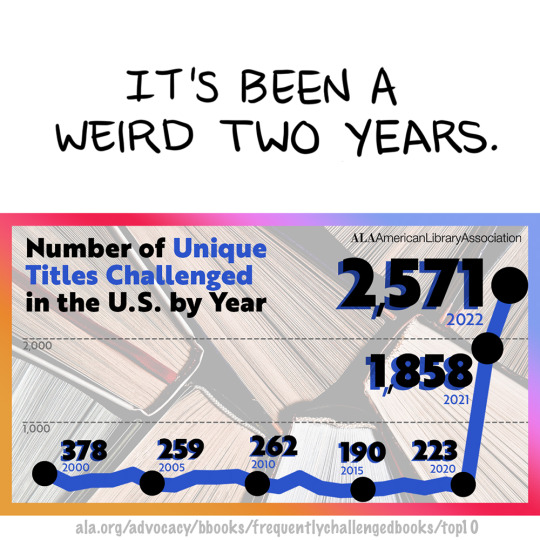

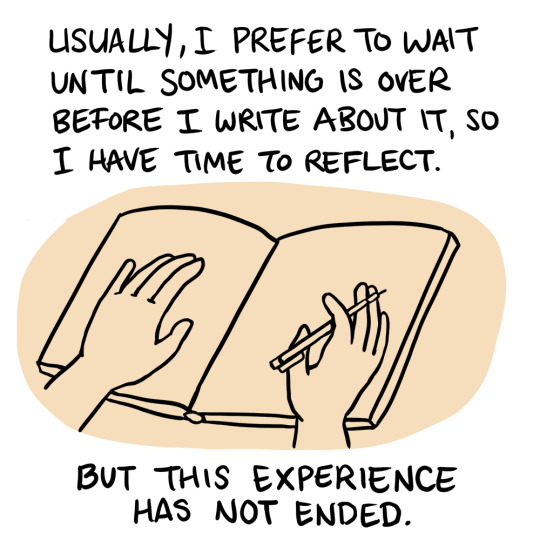
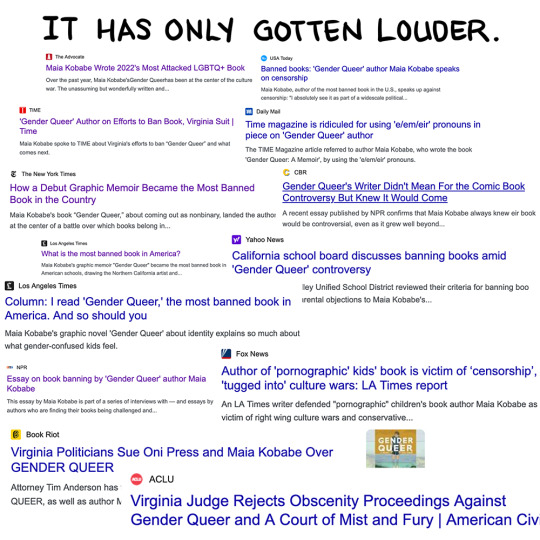
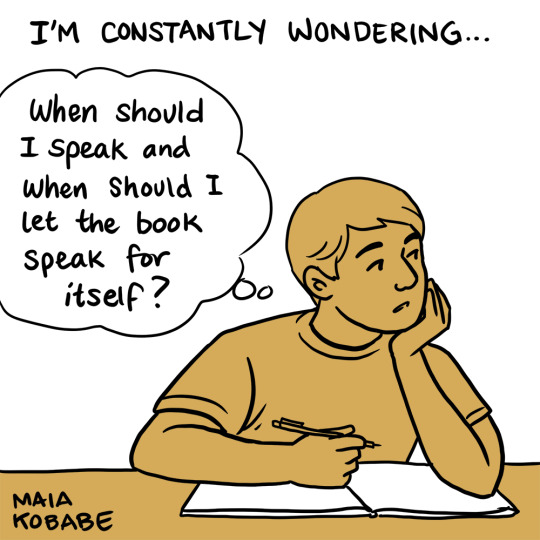
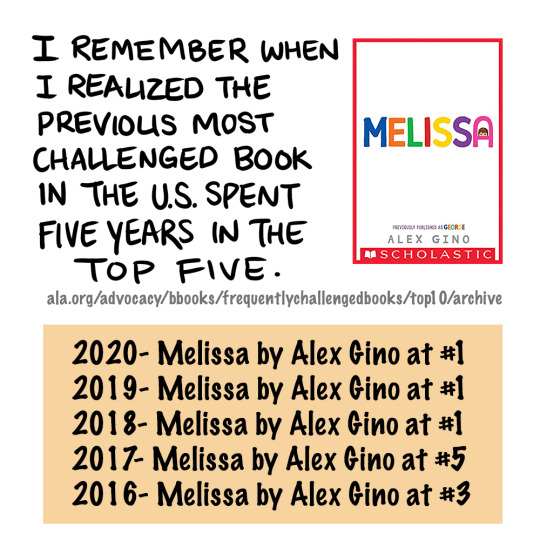


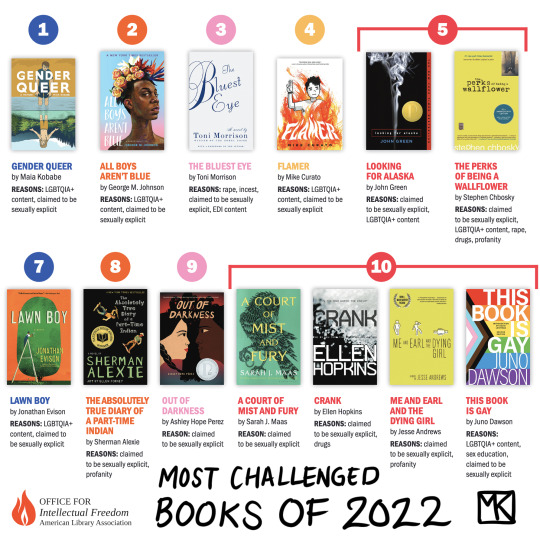
Transcript below the cut.
instagram / patreon / portfolio / etsy / my book / redbubble
Keep reading
4K notes
·
View notes
Text
Physical media haul, part one
Text only, because uploading multiple pics to one post is kind of a pain. I still have a draft of fanart I wanna redo because of exactly this, but anyway:
BOOKS
Read but I wanna reread:
Wiseguy by Nicholas Pileggi
This is 'the book that inspired Goodfellas' and I read it before watching the movie. I read it in 2012, (god I thought it was 2014) and recall that because it was weeks before Henry Hill died. So, I was 14 when I read it- hey, that's where the 14 comes from! Checked it out from the library, and no my parents weren't bothered by it because my Dad's had documentaries about organized crime playing in the house for as long as I can remember. First time I sought stuff like that on my own, pretty sure I read it before Helter Skelter. Wanna reread because Goodfellas is one of my fave movies, and I wonder how my interpretation of the book will have changed in 11 years/how much has the movie influenced me. If I feel motivated enough, I may document that reread on here, 'cause why not?
New books (to me)
Aliens novelization by Alan Dean Foster based on James Cameron's screenplay
The Big One I wanna find is Foster's novelization of Alien, the first film, and again one of my favorite films, but I will settle for the sequel, because the movie's still pretty good.
Till Death Us Do Part by Vincent Bugliosi with Ken Hurwitz
More from the GOAT Bugliosi. The way he humanizes victims of true crime, his attention to detail, his passion for justice, I love him. Enough said. You wanna read true crime that doesn't feel like a spectacle, comes from one of the people most involved in the case, he's your guy.
Merriam-Webster's Italian-English Dictionary
Yes, this is my fourth course on Duo. Yes, I have a problem.
Chain Letter by Christopher Pike
The same author who wrote The Midnight Club, which was adapted into a show by Mike Flanagan, whose work is kinda hard to find out in the wild, for me at least. First thing I've read from him is Die Softly, a paperback with a gorgeous late 80s/early 90s cover, and has an absolutely haunting ending, highly recommend. So, this edition of Chain Letter is actually two stories in one, the second being The Ancient Evil, and they're from 1986 and 1992 respectively, and this paperback edition is from 2013-
I hate the new cover. If you've ever seen one YA fiction novel cover from the 2010s, you've damn-near seen them all. Utterly boring, you'd think they were written by a different author of the same name (which I did think for a while there). It also?? Does nothing to advertise the second story??
We Have Always Lived in the Castle by Shirley Jackson
Same author of The Haunting of Hill House, which I read in 2018. It's very different from the Flanagan series, but the show kept a lot of the spirit, again a case of 'I read the book first'. Really enjoyed both, have seen the movie for 'Castle, will be interesting to see how faithful of an adaptation it was.
DVD/music haul in part 2!
#physical media#my beloved#the smell of old books#the joy of adding to your (overstuffed) shelf#books#fiction#nonfiction
0 notes
Text
Coming Attractions September 2023
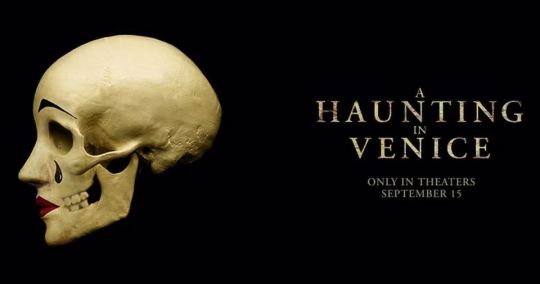
As usual, we present monthly previews of new movies being released. These are the movies that will be hitting your local cinemas (and streaming services) this month:
September 1st
The Equalizer 3 - Antonie Fuqua and Denzel Washington team up for their fifth film together and the third (and final?) film of The Equalizer trilogy. Both the first and second Equalizer films had almost identical box office grosses, $100 million domestic and $90 million overseas for a worldwide haul of $290 million. Will part 3 continue this trend? Wait and see.
The Good Mother - Hilary Swank stars in this crime thriller about a mother trying to find those responsible for her son’s death.
September 8th
The Nun II - This supernatural horror film is the NINTH installment in The Conjuring Universe franchise and is a direct to 2018′s The Nun.
My Big Fat Greek Wedding 3 - The Portokalos family is back with this third film in the series that comes 21 years after the release of the sleeper box office hit of a first film and 7 years after its sequel. Star Nia Vardalos, who also wrote the first two films, adds director to her duties for this third installment.
September 15th
A Haunting in Venice - Kenneth Branagh is back as Hercule Poirot (and in the director’s chair) for this latest Agatha Christie adaptation - this time the 1969 novel Hallowe’en Party. Tina Fey, Jamie Dornan, Michelle Yeoh, and Kelly Reilly join the cast this time around.
Dumb Money -The GameSpot short squeeze of January 2021 is making its way to the big screen with this adaptation of a book by Ben Mezrich. Paul Dano, Pete Davidson, Seth Rogan, America Ferrera, and Shailene Woodley star in the comedy-drama.
September 22nd
Expend4bles - Jason Statham, Sylvester Stallone, and Dolph Lundgren are back for a fourth film in the Expendables film franchise with Curtis “50 Cent” Jackson and Megan Fox joining the team.
Spy Kids: Armageddon - Coming to Netflix this month is a reboot of the Spy Kids film franchise from Robert Rodriguez, starring Gina Rodriguez and Zachary Levi.
Flora and Son - Writer/Director John Carney is back with his first film since 2016′s Sing Street. Starring Eve Hewson and Joseph Gordon-Levitt, this musical comedy-drama will be in theaters for a week and then hit AppleTV+.
September 29th
The Creator - John David Washington stars in this original science fiction action thriller from director Gareth Edwards, the director’s first film since Rogue One.
Saw X - Tobin Bell is back as Jigsaw in the tenth film in the series that acts as a direct sequel to the first Saw film and a prequel to Saw II.
PAW Patrol: The Mighty Movie - Ryder and the gang are back for this sequel to 2021 PAW Patrol: The Movie.
She Came to Me - Peter Dinklage, Marisa Tomei, and Anne Hathaway star in this upcoming romantic comedy from writer/director Rebecca Miller.
Now for a quick look ahead to October, my top picks for next month are Killers of the Flower Moon, Priscilla, and Taylor Swift: The Eras Tour.
-MB-
1 note
·
View note
Text
Know Thyself: Unlocking Your True Potential
Note on the text: I used Madeline Miller's Circe as published in 2018 by Back Bay Books
Circe is a different kind of woman. This book makes an excellent companion piece to The Odyssey. This book really explores the character of Circe in a really interesting way. She's not quite a goddess but not a human either. She's something in between, and her journey towards self discovery is what makes up the central story of this book.
"When I was born the name for what I was did not [yet] exist" (3). It's obvious from the very beginning that Circe is something different. Because although her father is the sun god Helios and her mother is the nymph Perse, she never feels like she really belongs among them. She's not like either one of her parents. In fact, she's not really like any of the gods that she grows up with. The gods, including Helios and Perse, are vain and cruel creatures who believe that the "world's natural order [is] to please [them]" (4). They're incredibly self centered and don't particularly care about how their actions affect others. Circe is different though. She cares about other people. Pretty early on in the book Circe recounts how her dad told her that on earth there were people
called astronomers whose task it was to keep track of his rising and setting. They were held in the highest esteem among mortals, kept in palaces, as counselors of kings, but sometimes my father lingered over one thing or another and threw their calculations into despair. Then those astronomers were hauled before the kings they served and killed as frauds. My father smiled when he told me. It was what they deserved, he said. Helios the Sun was bound to no will but his own and none might say what he would do" (11).
Remorse is a foreign concept to the gods, even the lesser ones. Pasiphae, Circe's sister, is delighted by the amount of destruction that her son, the Minotaur, will bring because it means that people will talk more about her. Even Boreas, the god of the north wind, would rather kill his beloved than risk losing him to Apollo: "you think I'd let Apollo have him? He does not deserve such a flower. [So] I blew a discus into that boys head, that showed that Olympian prig", and whereas Helios feels no remorse over the death of those people, Circe feels incredibly bad for them (26). Prometheus however is the first god to show Circe that she can be different.
When she first meets Prometheus he is being punished for bringing fire to mankind as an act of mercy. He saw the people suffering down below and decided to help them, in defiance of Zeus' specific orders no less, and when she asks him why he says that "not every god need by the same" (22). This winds up being a very telling moment for her because when she asks him what a human is he says that "there is no single answer. They are [all] different" (22). She does not know it yet, but what she comes to learn is that gods and humans aren't so different. The problem here is choice, and just like the gods can choose who they want to be, so can the humans. Human beings can choose to live a life that is meaningful. In fact, the fact that every human is destined to die pushes them to do so. The gods for all their power tend to live a life that is purposeless. They don't live for any reason other than to satiate their most basic desires. They, other than Circe and Prometheus, never choose to live for something outside of themselves which means that, even though they are immortal, "they are more dead then anything[.] For they are unchanging" (485).
Humans have the ability to change in a multitude of ways. On the one hand, they have the ability to change themselves. They, unlike the gods, can regret what they done and choose to be better. Daedalus regrets playing the role he did in bringing the Minotaur to life, Telegonus regrets accidentally killing his father Odysseus. Circe, for her part, regrets trying Scylla into the horrible monster that she becomes. On the other hand, humans also have the ability to change the world around them through "practice and diligence, tending [to] their skills like gardens until they glowed beneath the sun" (135). It is in this way that Circe realizes who she is and is able to tap into her power. It is in the realization that she is a sorceress as opposed to either a goddess or a human that she is able to unlock her full potential:
Let me say what sorcery is not: it is no divine power, which comes with a thought and a blink. It must be made and worked, planned and searched out, dug up, dried, chopped and ground, cooked, spoken over, and sung. Even after all that it can fail as gods do not. If my herbs are not fresh enough, if my attention falters, if my will is weak, the drought goes stale and rancid in my hands. By rights, I should never have come to witchcraft. Gods hate all toil. It is in their nature. The closest we come is in weaving or smithing but these are skills, and there is no drudgery to them since all the parts that might be unpleasant are taken away with power. The wool is dyed not with stinking vats and stirring spoons but with a snap. There is no tedious mining, the ores leap willingly from the mountain. No fingers are ever chaffed, no muscles strained. Witchcraft is nothing but such drudgery. Each herb must be found in its den, harvested [at the proper time], grubbed up from the dirt, culled and stripped, washed and prepared. It must be handled this way and then that to find out where its power lies. Day upon patient day, you must throw out your errors and begin again. So why did I not mind? Why did none of us mind? I cannot speak for my brothers and sisters, but my answer is simple. For a hundred generations, I had walked through the world drowsy and dull, idle and at ease. I left no prints, I did no deeds. Even those who loved me a little did not care to stay. Then I learned to bend the world to my will, as a bow is bent for an arrow. I would have done that toil a thousand times to keep such power in my hands. I thought: this is how Zeus felt when he first lifted the thunderbolt (83-84).
And just like that Circe, the little nymph-reject of Olympus, found a power inside of her that rivaled Zeus'. Humans are like gods in that way. The power we have over our lives is very real. We have the ability build real, meaningful lives for ourselves and that power is very, very real. That is the only kind of power that actually matters.
1 note
·
View note